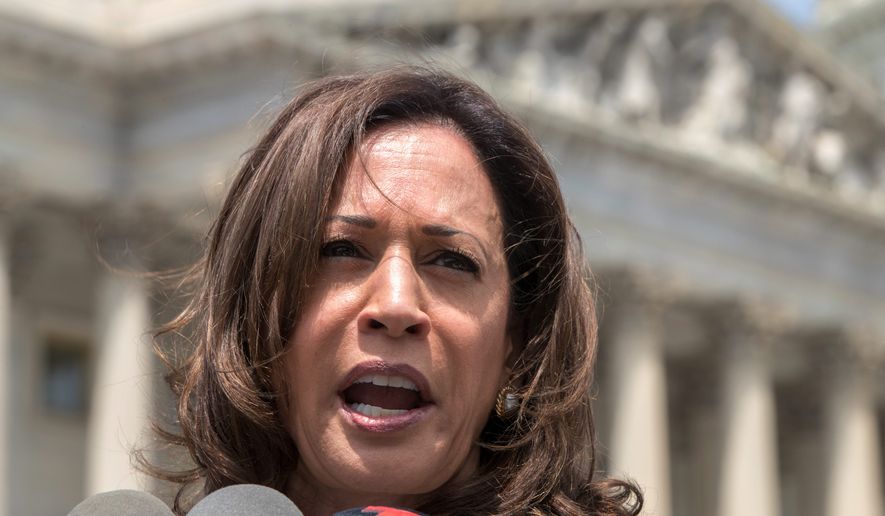Sen. Kamala Harris suggested this week that President Trump’s pick for the Supreme Court might have derailed efforts to end racial segregation if he’d been on the bench in the 1950s.
Ms. Harris, thought to be eyeing a bid for Democrats’ presidential nomination, will have a particularly high profile in the fight over Judge Brett M. Kavanaugh, with a prime position on the Senate Judiciary Committee giving the former California attorney general a chance to go toe-to-toe with the nominee.
So will Sen. Cory Booker, a New Jersey Democrat who’s also on the committee and is seen as a 2020 hopeful.
Others — Sens. Elizabeth Warren, Bernard Sanders and Kirsten Gillibrand — aren’t as lucky. They may have private sit-down meetings but won’t get the chance to question Judge Kavanaugh the way Ms. Harris and Mr. Booker will.
“It’s going to be a high-profile, high-public exposure opportunity for both of them to demonstrate how they think, what drives them, and what most concerns them about the direction of our nation,” said Faiz Shakir, national political director of the American Civil Liberties Union. “Those are basic questions people generally want to know about presidential candidates, and they each have the opportunity and platform to show, not tell.”
“What their plans are down the road is their business, but you know this is an opportunity for them both to raise their profile, but also really help win this issue for Democrats, which is important both substantively and politically,” said Brad Woodhouse, campaign director of Protect Our Care, which is fighting the Kavanaugh nomination.
It’s likely to turn into a Kavan-off: A battle to outdo one another in coming up with the most devastating attacks or the best sound-bite explanations for opposition.
The jousting began just minutes after Mr. Trump made his pick.
Ms. Harris began an online petition drive to try to rope in more supporters by vowing stiff opposition. Ms. Warren went further, telling voters the “surefire way” to stop Judge Kavanaugh’s elevation was to contribute to her Senate campaign.
Democratic leaders stood outside the Supreme Court on Tuesday with their team on the Senate Judiciary Committee, firing broadsides at the nominee.
“Let’s be clear about what this is about,” Ms. Harris said. “It’s about government taking on the decision about a woman and what she does with her body, instead of giving that woman and her family and her God the power to make the decision for herself.”
That’s a standard objection many Democrats have lodged.
But Ms. Harris went further, saying the arc of her life would have been much different if someone like Judge Kavanaugh had been on the high court in the 1950s, when the justices ended legal segregation, beginning with the Brown v. Board of Education ruling.
“Had that decision not come down the way it did with the full force and authority of one individual who brought the entire court together, I would not be standing here as a United States senator, Cory Booker would not be standing here as a United States senator,” Mrs. Harris said. “The decision that one person makes on that court can have ramifications for the future of this country.”
Mr. Booker, meanwhile, saw the nomination as another round in the fight over special counsel Robert Mueller’s probe into the 2016 campaign.
Mr. Booker said Judge Kavanaugh’s past writings suggest he doesn’t think a president should face investigation.
Judge Kavanaugh would be one of nine justices, without the power to act alone on any final decisions, but Mr. Booker saw his elevation to the high court as a blow to efforts to ding Mr. Trump.
“Why are we going to allow this president to put someone on there that ultimately that is going to grant them immunity when push comes to shove?” he told reporters Tuesday. “I don’t think he should be on the court.”
Democrats, thanks to their own past handling of judicial nominees, have little power to derail Judge Kavanaugh on their own, given they only control 49 seats in the Senate.
They’ll need to win over GOP defectors and hold all of their members in line.
That could be difficult. Several Democrats backed Mr. Trump’s first Supreme Court nominee, Justice Neil M. Gorsuch, and a number of Democrats are up for re-election this year in red states that Mr. Trump won by massive margins in 2016.
Some of those red-state Democrats have seemed put off by their party leaders’ quick rejection of Judge Kavanaugh — a divide that’s likely to grow as confirmation votes near.
• Seth McLaughlin can be reached at smclaughlin@washingtontimes.com.




Please read our comment policy before commenting.